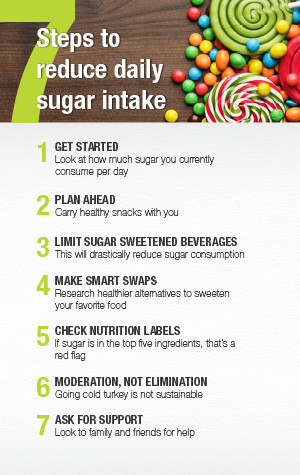By: Catherine Cooley, CHWC
The latest dietary guidelines issued by the U.S. Department of Health and Human Services and the Department of Agriculture urged Americans to reduce added sugar to no more than 10 percent of calories per day. To put that into perspective, that means the average person consuming a 2,000 calories diet should get no more than 50 grams or 200 calories from added sugar per day.
So, are you eating too much? According to the American Heart Association, the average American consumes 385 calories from added sugar daily—almost double the recommended limit. And it’s easy to do. For instance, just one 20 oz bottle of Mountain Dew contains 77 grams of added sugar.
Getting started
First, figure out how much added sugar you are currently consuming in a given day. You can determine this by keeping a food journal, or use an app such as MyFitnessPal to keep track of your sugar intake throughout the day. Try doing this for three consecutive days to establish a baseline. From there, set small goals to taper unnecessary sugar in your diet.
Plan ahead
Think about the time of day when you are most likely to reach for a sweet snack. For many people, it’s late afternoon when you’re looking for a pick-me-up at work, or before bedtime while you’re watching television. By being mindful of those times when you’re most likely to be tempted, you can plan ahead by bringing in healthy snacks to leave at work, or by getting rid of the tempting foods you have in the house.
Limit sugar sweetened beverages
Sugar-sweetened beverages account for almost half (47 percent) of all added sugars consumed by the U.S. population. Resolving to cut back on sweetened beverages such as soft drinks, sweetened coffee and tea, energy drinks, and sugar-laden alcoholic beverages, can drastically impact excess sugar consumption.
Smart swaps
Investigate some healthier alternatives to sweeten your favorite foods. For example, try substituting sugar-free applesauce for sugar in a batch of oatmeal cookies. Use a food processor to blend a cup of raisins or dates that can be used to sweeten up any baked good while also adding in healthful antioxidants and fiber. With a little research, you’ll realize there are tons of simple and realistic substitution options you can use to replace added sugars.
Make it a habit to check nutrition labels
By doing this, you will quickly realize how often sugar is added to everyday foods such as bread, salad dressing, and sauces. You may be shocked at how much added sugar is in “health foods,” such as granola bars and yogurt. Start by reading the ingredient list. Look at the first five ingredients, which are listed in order of how much is in the product, and if you see sugar in the top five, that’s a red flag.
Moderation not elimination
The key to success is sustainability. Going cold turkey on added sugar isn’t realistic for most people, nor is it sustainable. Instead, try to cut back gradually in order to adopt the new behavior into your lifestyle. For example, if you normally use two packets of sugar to sweeten your coffee or tea, try cutting back to one. Combat feelings of deprivation by giving yourself permission to enjoy and savor your favorite treat every so often, while being mindful of moderation. Even small changes over time can add up to making a big difference.
Ask for support
Ask for support from friends, family and co-workers as you start making these lifestyle changes. Remember to set small goals and to benchmark progress along the way. Recognize and celebrate success by rewarding yourself for making progress and reaching goals.
About the Author: Catherine Cooley, CHWC, is a Health Coach at Priority Health. She is passionate about supporting Priority Health members on their journey to wellness and achieving their personal best. Catherine is a certified weight management specialist through the American Council on Exercise (ACE) and a lifestyle coach through the National Kidney Foundation’s Diabetes Prevention Program.


